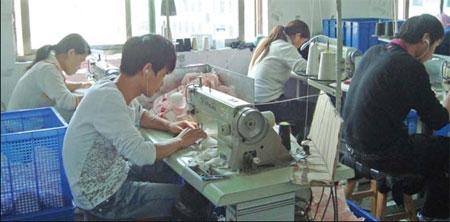Small steps, big strides
Updated: 2011-11-11 11:11
By Yan Yiqi (China Daily European Edition)
|
|||||||||||
|
 Zhejiang Shilei Socks, which has more than 70 percent of the market in Japan for liner socks, plans to expand in the domestic market. [Yan Yiqi / China Daily] |
Little-known sock maker enjoys niche market success in Japan
In the dusty and crowded by-lanes of Yiwu, people often talk about the big strides made by a relatively unknown sock maker in the land of the rising sun.
For several years now, a Yiwu company has been the undisputed market leader with over 70 percent market share in Japan for liner socks, a short sock extremely popular with youth.
Zhejiang Shilei Socks, the company in question, is just another of the several sock manufacturers that dot the Yiwu landscape and hardly raises an eyebrow. But in a remarkably short time, the company has carved a niche for itself with its liner socks, much to the chagrin of its bigger peers.
Liner socks are often worn with high heels or dress shoes to prevent blisters, but their short-cut edges often make women look like they are not wearing socks at all. In other words it represents convenience and comfort.
But in downtown Yiwu, Shilei hardly looks like a company that has annual sales in excess of 200 million yuan ($31.5 million, 22.8 million euros).
Liner socks became popular in Japan in the 1980s and it was not until the mid 2000s that the trend was replicated in the Chinese market.
Shilei started producing liner socks as early as 2002, when most people in China had not even heard of it.
"At that time, there were over 1,000 sock factories in Yiwu, fighting for cotton sock export orders from international brands. We thought we needed to do something different to survive," says Long Quan, manager in the domestic department of Shilei.
"It was a very bold step to take then, as we did not know whether liner socks would be accepted by Chinese women, and even if so, what the acceptance time-frame would be," he says.
But in the last eight years, it has been the Japanese market that has been Shilei's mainstay.
"Initially we decided to team up with Taiwan companies for liner socks as Taiwan was often the fastest to follow Japanese fashion trends," Long says.
"The Japanese market was not easy to enter, because not only are they very strict on quality, but also very picky. They pay attention to even the minutest details, and we had lots of problems in the initial stages," he says.
Long recalls an instance when a Japanese client rejected an entire shipment worth over 1 million yuan, as some tiny thread ends were found in the finished products.
After several failures and downturns, Shilei now has a dominant market share in the Japanese market and eight patents.
"Since last year, we have been looking to the domestic market for growth as the Japanese market is already saturated and there is not much room for profits," says Wu Guoqing, general manager of Shilei.
"Export is just one leg, and domestic market is another. We have to walk fast with both legs," says Long.
The company is now working with supermarkets, franchise stores and TV shopping programs, and plans to open five to 10 stores of its own in Yiwu. The ambition is to open stores to three-digit levels in the next five years.
By the end of October, the sales revenue from the domestic market reached 10 million yuan, accounting for nearly 30 percent of the total revenue.
"Our biggest problem is that consumers in China do not have brand loyalty. Most people will not pay attention to the brand of socks, let alone the liner socks which cost only 5-8 yuan," says Long.
Long says that though Laxdi, the main brand of Shilei, is famous in Japan and South Korea, it is still unfamiliar to most Chinese consumers.
Speaking about the prospects in Western markets, Long says that he would prefer a cautious approach.
"Liner socks are not very popular in Europe and the United States right now. I think we need to wait for the right time," he says.








